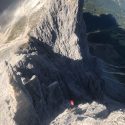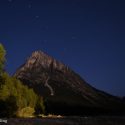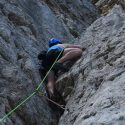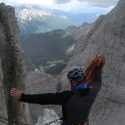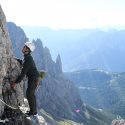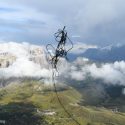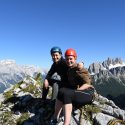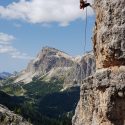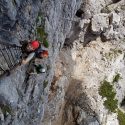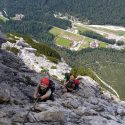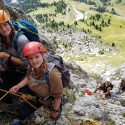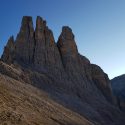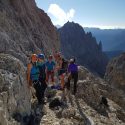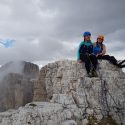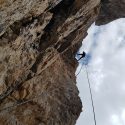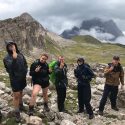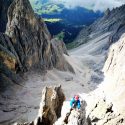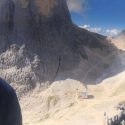Exercise DELAGO TIGER was the fourth annual Exeter University Officer Training Corps (EUOTC) expedition to the Dolomite Mountains in N Italy 22 August – 9 September 2018. It comprised 35 personnel, 9 x rock climbing and mountaineering instructors, 3 admin staff and 23 Officer Cadets and was based at campsites near Cortina and Canazei. The aims of the expedition are to expose Officer Cadets to multi-pitch rock climbing and mountain walking in a challenging environment to; develop their leadership and resilience skills; promote the wider benefits of Officer careers and allow them to undertake Joint Service climbing and mountain walking qualifications. The Officer Cadets were split into a rock climbing and a mountaineering group. The climbers, many complete novices, were split into pairs with a rock-climbing instructor and after an initial day learning how to use the climbing equipment and safety procedures quickly progressed onto multi-pitch rock climbs, which normally necessitated one or more abseils to descend from summits. The mountaineers were split into two groups for mountain walks, including a three-day expedition staying at mountain huts, and undertook 2-3 Via Ferrata routes. Via Ferrata involves clipping into steel cables for safety and ascending cliffs and mountain ridges, which would otherwise only be accessible to experienced mountaineers and climbers. EUOTC runs a variety of skiing, climbing, sailing and mountain biking adventure training expeditions each year, the Dolomites trip is generally considered the most ambitious due to the fantastic climbing and mountaineering opportunities it affords, spectacular mountain scenery and the lasting experiences and memories it leaves with the Officer Cadets.
The three compositions below by Officer Cadets detail some of their thoughts and experiences and how they benefited from the expedition.
Aoife Smith (Novice Climber):
“Being an inexperienced climber, I was keen to secure a place climbing in the Italian Dolomites with EUOTC to both challenge myself by undertaking a new somewhat daunting activity, as well as seize the opportunity to travel to a new country. The first day covered all the safety aspects at a single pitch crag allowing us to build up our confidence and experience. Each following day would involve climbing in a new location with a different instructor and fellow officer cadet. Having the opportunity to engage with new instructors allowed us to draw on a variety of expertise experiences, something I found interesting and invaluable. In addition to climbing, we also had the opportunity to gain an insight into Italian culture by spending our well-earned rest day in Venice. One of the highlights of the trip for me was climbing the Hexenstein with Huw (instructor) and Rory which offered a combined climbing and cultural experience. The route finished right on the summit, offering spectacular views and the descent involved walking down through World War One trenches.
“It is fair to say that the trip enabled me to truly test myself both mentally and physically; one day stands out as being notably challenging. With an early start of 8:30am, Gary (the instructor), Max and I were keen to embark on a 10 pitch climb which would be the longest and hardest climb yet. Unfortunately, after reaching the 8th pitch, we found ourselves having to abort the climb due to a sudden, but persistent rain and snow storm, hence leaving us without any choice but to descend by abseiling back down the 200m of rock we had just climbed. Scared, soaked and frustrated due to repeatedly jammed ropes and poor weather conditions, the abseil took us a total of 6.5 hours. Despite returning to camp almost 12 hours after we started, we collectively maintained morale during the exhausting abseil to ensure we would reach the bottom safely and as quickly as possible. Being surrounded by people who continuously encouraged and assured each other, in the face of adversity, taught me the importance of working together to maintain concentration and using fear positively to achieve the end goal; skills which are essential aspects of officer training.
“Overall, the trip taught me the value of pushing yourself out of your comfort zone as well as the need for teamwork. I would highly recommend this trip to anyone keen to develop their climbing ability and, most importantly, due to the new friendships as well as the invaluable skills and lessons that one can take away from the trip.”
Poppy Rampling (Intermediate Climber):
“Having heard only great things about the EUOTC’s trip to the Dolomites and being a keen climber, I was swift to put my name down for the trip. I was very grateful and excited when I found out that I would spend 2 weeks of my summer, climbing in some of the most incredible landscapes.
“During our first day the four more experienced climbers moved straight to an area called Cinque Torre which consisted of many multi-pitch climbs. We were partnered off and put with one instructor per pair. I was partnered with my friend Michelle who I had frequently climbed with in the past, this made the first climb a little more relaxed as we knew each other’s capability and what relevant information we could pass between each other. Our instructor (Ian) decided that we would do the hardest climb of the day, first. It was a beautiful six pitch trad route that is well equipped with fixed gear. The first 3 pitches were a vertical climb on the west side; there had been snow overnight and this section of the climb was in the shade so it was bitterly cold, climbing proved quite difficult as our fingers were freezing which made manoeuvres very difficult. During around the 4th pitch we moved over to the left and over an arête which brought us into the early morning sun, this was a beautiful moment, not only because it warmed our bodies but it also gave us a great view of the immense and stunning landscape that surrounded us. A few, harder pitches later and we reached the sun kissed top of Torre Lusy, we sat on the flattened rock appreciating the 360° views that surrounded us. To the right there was a shear face of another one of Cinque Torre’s climbs which had two ant-like figures working their way up, to the left we could see snow topped mountains and deep green valleys.
“Now around 200m up a stand-alone rock pillar, we had to traverse along the top of the climb towards an abseil point. Once secured into the abseil ring, Ian showed us the appropriate way to set up a safe abseil, taking note of which rope to pull on to release the ropes and learning how to secure ourselves onto the ropes. The abseil itself was around 45m which included a free abseil (which is an odd experience, even if you are used to it).
“Over the next couple of days, we stayed working through the climbs at Cinque Torre and went to some single pitch areas. These days were essential for the success of the rest of the trip as they ensured that we knew everything necessary to be competent and safe climbers in preparation for the longer, harder climbs. The novice climbers were learning incredibly fast and developing good climbing techniques. As they progressed, they started to be paired up with the intermediate climbers; this was beneficial as we could give advice to the new climbers and help them to develop further.
“At the halfway mark of our trip we got to visit one of Italy’s most beautiful Cities, Venice. We spent the day taking in the culture and appreciating a day where our feet remained firmly on the ground. Admiring the beautiful architecture whilst eating pizza and gelato in the Italian heat was an absolute treat and felt like luxury in comparison to our tents in the ever-changing weather of the Dolomites. It was a great pleasure for me as a photographer to capture the diverse lifestyle and beauty of this City; an opportunity that I would not have got having not been on this trip.
“Moving from Cortina to Canazei mid-trip provided us with more climbs and harder routes. The first climb was called Little Micheluzzi, it consisted of 8 pitches which included a traverse. The climb was quite straight-forward for the majority however there were some hairy points. Me being only 5”3 is sometimes of great advantage when making technical moves, however, when the hand hold is a foot out of reach with very little foot placement, things get interesting and you get what I like to call ‘The Elvis shakes’. Though, for me, if my legs aren’t experiencing this at least once during a climb, it’s not worth climbing! With the climb, complete, we had to negotiate narrow paths and caves to return to ground level, timing it very well before the heavens opened upon us.
“By far my most favourite climbs were located at the Vajolet Towers, where I was partnered up with a novice climber who was absolutely terrified of heights. He had slowly been getting over his fears on the shorter, more gradual climbs however the Vajolet Towers are a whole other ball game. The first climb we did was called Delago Tower, a beautiful climb however not one for the faint of heart. One of the pitches involved moving from a seemingly comfortable climb and belay ledge some 60 metres up on the right-hand face around an arete to the left where the rock descends vertically hundreds of metres to the valley floor. Being the last person to this belay stand and us being in cloud at the start of the climb, I did not see or prepare myself for what was to come. My fellow climber (Jolly) did not look comfortable, clinging to the rock and not engaging in conversation, I could see this was becoming a distressing situation for him, as I belayed our instructor up the next pitch, I maintained a steady conversation with him and talked him through his first few movements as he began to climb. This pitch was a particularly nerve wracking one, even for someone who is comfortable with heights, I certainly felt the adrenaline pumping as I was clinging onto a polished rock-face with nothing but air below me. We finished the climb with 2 abseils and a great sense of achievement. I was in awe of Jolly’s bravery on that climb, it was undoubtedly a challenge which he overcame with flying colours. In Jolly’s words it was “absolutely amazing and completely stretched my comfort zone, in terms of an Adventure Training trip, it definitely pushed me. I certainly haven’t beaten my fear of heights but I certainly have become more acclimatised to it. What a fantastic trip!”
“My final day of climbing was one of the most memorable and testing days, most of the other climbers decided to spend the day on single pitch climbs, however I wanted to make the most of my time in the Dolomites and tackle another multi-pitch climb; The Thumb. I was the first group of 3 to attempt the climb, we battled with mist, slippery rocks and thunder but my instructor and I made it to the top by 14:30, we abseiled to the first belay point where we had to make a make-shift Via Ferrata using our gear for the next 2 groups to use. Expecting the groups to be no more than a couple of pitches behind, we waited. The weather started rolling in and we were bombarded by freezing mist and violent hail; sitting on a slab, huddled to the rock, our bodies began to shake uncontrollably, an hour and a half later we saw the first member of the other group. From this point on we were quick to action, we were in a bad way because of the cold and needed to get down fast. With 3 more abseils to negotiate, we carried rope after rope to set them up and get down as soon as possible. Once down to the hut, we were obviously thrilled to find that the gondolas had stopped running, resulting in us having to walk down the mountain for 45 minutes with clouds darkening and thunder rumbling around us. It’s these trips and these experiences that make me value my time within the OTC and this trip was a big step towards my ambition of becoming a climbing instructor.”
Jack Rickard (Mountaineering):
“As I finish my time at University and move on to a career in the regular forces it would seem appropriate to look back on my experiences which have helped shape the person I am today, especially those that have taken me outside my comfort zone. Many of these have been through the Officer Training Corps, a part of the Army Reserve responsible for recruiting Officers for the Regular and Reserve forces.
“Outside of the traditional military training I have had numerous opportunities to participate in Adventurous Training. Most recently I was able to complete a foundation course in Summer Mountaineering in the Italian Dolomites. Despite the wonderful location, the course was not without its challenges: unexpected snow and thunderstorms are made all the worse when you’re 2500 meters up the side of a steep mountain!
“The mountaineering was complemented by opportunities to enjoy Via Ferrata routes and rock climbing. Almost a cross between mountaineering and rock climbing, Via Ferrata allows for the crossing of challenging terrain quickly. The sport traces its route back to the First World War when there was a front line through the Dolomite region. The Italian and Austria-Hungarian forces laid rope and steel cables up the mountain. Soldiers would then attach to the cables so that they could scale the treacherous heights at speed and in relative safety with all their equipment.
“As an aspiring military officer it was incredibly interesting to learn of the realities of historical warfare and the conditions the men experienced. When walking at height, the exposure to the elements even in the summer made movement difficult. To be able to lead soldiers in the winter in those conditions, where the temperature can drop to minus thirty degrees would have taken exceptional leadership. The highest museum in Europe, at the top of the Marmolada Glacier, is dedicated to telling the story of the men who fought in the Dolomite region. Many of the people fighting came from the mountain communities which often saw cross border relationships for personal and business reasons. To be at war for several years meant that friends could be forced to fight each other; their allegiance to either Austria or Italy being dictated by which side of the front line they lived. In addition to the museum, original trenches and observation posts have been preserved.
“Though it was the physical challenge of completing the course which is what I found most valuable. In a way, completing a day’s mountain climbing was a microcosm of university. Numerous ups and downs (pardon the pun!) but the team around you keeps you going. The shared goal to persevere was key to every individual’s ability to complete the course. Learning how to cope both physically and mentally when things don’t go to plan in a difficult, challenging situation has given me skills which have helped me cope with the peaks and troughs of university life. I owe a lot to the Army’s OTC for getting me through my time at university.”

